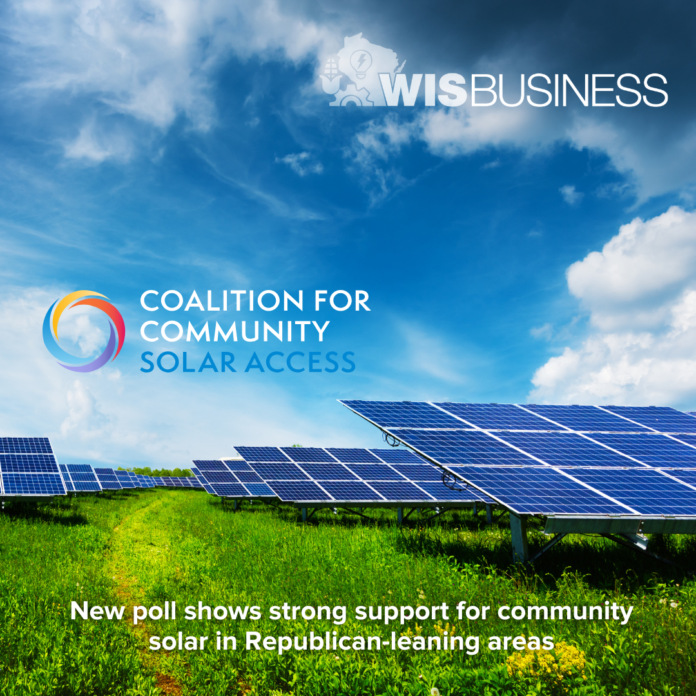A new poll shows support for small-scale community solar projects statewide and in Republican-leaning legislative action districts.
The poll included two separate sample sizes: 206 registered voters across the state who were polled July 18-24, and 219 registered voters in four separate Assembly and Senate districts who were polled July 18-Aug. 1. The margin of error for the statewide portion of the poll was 6.8 points and the margin of error for the others was 6.6 points.
The four districts polled were:
- Senate District 17 in southwest Wisconsin;
- Senate District 31 in western Wisconsin;
- Assembly District 85 in north-central Wisconsin; and
- Assembly District 88 in the Green Bay area.
All of the districts are held by Republican legislators except SD 31, which is held by Sen. Jeff Smith, D-Brunswick.
The statewide respondents were polled online while the district-specific respondents were polled via telephone and online with a 60-40 split.
The poll, conducted by Iron Light and commissioned by the Coalition for Community Solar Access, shows 79% of the statewide respondents believe Wisconsin lawmakers should support allowing community solar projects. That number dropped slightly to 77% for respondents in the four districts,.
Respondents in the four districts were also more likely to support a lawmaker voting for a local-control community solar bill with 66% saying they’d be more likely to support, 25% saying it wouldn’t make a difference for their support and 4% saying it would make them less likely to support.
The share of statewide respondents who said they’d be more likely to support a lawmaker who voted for such a bill was lower at 64% while 28% said it would make no difference and 5% said it would make them less likely to support.
And 64% of both respondent groups said lawmakers need to do more when it comes to acting on rising utility bills.
Roughly half of each group, 46% of district-level respondents and 52% of statewide respondents, said a candidate’s support of local, consumer-choice energy options like community solar is very or extremely important when deciding how to vote in an election.
The news comes as Republican lawmakers Sen. Pat Testing, of Stevens Point, and Rep. Scott Krug, of Rome, introduced AB 493, which would authorize community solar programs through which normal utility ratepayers could subscribe to a small-scale solar facility to receive credits on their electric bills.
The bill would also set limits on how much electricity the solar programs could generate and create other regulations.
However, a group of utility companies, Wisconsin Manufacturers and Commerce and Fair Rates for Wisconsin’s Dairyland in a letter in September urged lawmakers not to support the measure.
The group contended normal utility customers who don’t enter into community solar contracts would burden the cost of utilities purchasing electricity generated by the new solar projects.
They argued the new bill would “lock in profits for out of state and foreign investors by providing significant state subsidies for their [solar developers] projects, at no risk to themselves, and shift grid costs to non-participating electronic customers who can’t afford or wish not to support their projects.”
A group of pro-community solar organizations including the Coalition For Community Solar Access, RENEW Wisconsin, the Wisconsin Institute for Law and Liberty, Wisconsin Farmers Union, Associated Builders and Contractors of Wisconsin and others in a letter argued the bill would help keep costs down and generate power right where it’s used.
“Community solar’s a common-sense way to meet WI’s growing energy needs. With data centers and businesses using more power, we need energy that can come online fast and reliably,” the group wrote. “These projects are built in months, not years, with private dollars—not rate hikes. They keep energy money in WI, support farmers, ease pressure on the grid, and help families save on electric bills.”
The group also argued utilities earn profits by building more infrastructure and won’t “admit that local solar helps avoid those costly projects and saves everyone money in the long run – so instead, they use ‘cost shift’ as the bogeyman to scare people away from real competition.”See the poll results here.







